#Romanian filmmakers
Text
Meet Sebastian Stan, the actor who plays Donald Trump in The Apprentice
From Gossip Girl to Marvel Studios, to more independent productions: Sebastian Stan's career has been a roller coaster ride. During his visit to the Deauville American Film Festival, Vogue met the actor, who at 42 years old won a Hollywood Rising-Star Award.
BY LOLITA MANG

On October 9, Sebastian Stan will be Donald Trump in The Apprentice. Some know him for his role as Carter Baizen in Gossip Girl. Others, for that of the Winter Soldier in Marvel productions. But recently, the American actor, of Romanian origin, has ventured into more independent fiction, which sheds a new light on his career. At the Deauville American Film Festival, he came to present A Different Man by Aaron Schimberg, in which he plays Edward, a young disabled actor who decides to change his appearance to, he believes at the time, improve his life. On the contrary, this transformation marks the beginning of his fall. An antagonist role such as he has long played on our screens, and which he continues in The Apprentice, presented in May 2024 at the Cannes Film Festival, and directed by filmmaker Ali Abbasi. So many elements that made us want to talk with the 42-year-old actor during his visit to Normandy, where he was awarded the Hollywood Rising-Star Award. As proof of the new direction taken in his career, today considered by the proponents of European cinema, perhaps, let's confess, more snobbish than their American compatriots.
Vogue. Gossip Girl, The Covenant, The Apprentice or even Captain America: The Winter Soldier … Your filmography is full of antagonists!
Sebastian Stan: A lot of things came to me, other roles, I pursued them. What I am certain of is that I never wanted just one type of role. I wouldn't go so far as to say that I refuse the more traditional hero roles, which I also find very interesting, even difficult in some ways. But it's true, I've always been curious about the idea of playing complex characters, full of flaws. Sometimes, they are the antagonists. Often even! What interests me in human nature is the duality. We can be extremely good to each other, as we can become horribly evil. Life is more complex than that, there are not good guys on one side, and bad guys on the other. Each of us is capable of the best as well as the worst. The antagonists, in my films, offered a great potential for acting that I enjoyed exploring.
Even Edward, your character in A Different Man, seems consumed by envy.
Probably the most complicated character I've ever played! But he's still so realistic in so many ways. I was just talking about this: I hope a lot of people get a chance to see this movie because it's really about acceptance and truth. Someone asked me what I think are the most important human characteristics. I said: values, the relationship we have with ourselves, and how we treat others. When I look at younger generations growing up today, especially with social media, people are almost forced to be followers. Fewer and fewer people are brave enough to express their voices in a unique way to fight against conformity. When you look at a character like Edward, you understand that better. We've all lied to ourselves at some point in our lives. We've all wanted things we couldn't have. We've all envied the person next to us. I wouldn't go so far as to say that this film is a fable, but it has this ability to make us look inside ourselves, and ask ourselves: "What makes me different?" Rather than trying to be things that we are not.
For the first time, with A Different Man, you are putting on the producer's shoes. Why?
I found myself much more invested in the film. It was a very unique experience, which I had not anticipated, I must admit. When I met Aaron Schimberg, the director, at the very beginning of the process, we formed a great connection, and we tried to sell the film together here and there. He welcomed me with open arms in this collaboration, included me in all the conversations about the feasibility of the project. For example, I was the one who suggested that he watch the film Julie (in 12 chapters) because I think Renate Reinsve is incredible in it. I was even able to help with the prosthetics that are used in the film, as well as on the shooting. Let's be honest: it was a complicated shoot, to do in a very short time. Only about twenty days. As an actor, I worked harder, I didn't count my hours. As a producer, I helped Aaron Schimberg make the film as he had in mind. I learned a lot from A Different Man, that's for sure.
Does this mean you're going to try it again?
Oh yes! There are several projects that I have my eye on at the moment… But it’s very difficult to make films, which you probably know here in France. A film like A Different Man, honestly, if A24 studios hadn’t intervened, I’m not sure we would have managed to make it. The United States is not like France or the rest of Europe: there is not the same support allocated to the film industry from institutions. There are no dedicated funds, it’s up to you to manage on your own. When you fight for a film, in addition to playing in it as an actor, it’s both exhausting, but terribly rewarding.
It’s a role for which you were awarded a prize at the Berlinale , and tonight, you’re going to receive a Hollywood Rising-Star Award here in Deauville. At 42! That’s joyful!
I know! I'm a 42-year-old emerging actor, I should say that in my speech... The thing with this industry is that you're constantly growing. It's true, I'm 42, but for the first time, I feel like I'm learning very important things, that I wish I had known much earlier! It was a strange year for me, between the Berlinale, the Cannes Film Festival, Deauville ... For my two films, The Apprentice and A Different Man, I felt real support from the European festivals, very prestigious ones at that. It was very special for me who had never experienced that before. And then I have immense respect for European cinema, which for me is synonymous with real work and authenticity. Here, if people don't like the films, they're not afraid to say so! So that my films have been so well received here, it means a lot.
You are European yourself, you grew up between Austria and Romania…
That’s right. I lived in Romania for the first eight years of my life, and then in Vienna for four years. Coming to the United States in the mid-1990s was a turning point in my life. There, I had opportunities that I would never have had in Romania. That’s why I’m so interested in the idea of the American dream, which is reflected in many of my films. A Different Man and The Apprentice both explore it, in their own way. I think the central question of both of those works is: “When is enough enough? How far can we go to get what we want? Why do we always want to win?” Coming from Europe, where the philosophy is almost the opposite of that, helped me in many ways. I don’t know if I would have approached my roles in the same way.
In A Different Man , you don't speak much, but the physicality of the role is evident. How did you work on it?
Luckily, I was there from the beginning of the shoot. Our makeup artist, Michael Marino , who was working multiple shoots at the same time, would put the prosthetics on me very early in the morning. So I had this time before the shoot where I would walk around the streets of New York with this face that is not mine, and see the reactions of the people around me. It was scary, and enriching in many ways. It helped me understand what it meant to live in the shoes of a man like Adam Pearson, because I wouldn't have been able to realize it otherwise. Adam was very honest with me and talked to me a lot about his experiences, which helped me a lot. And then as an actor, I myself live this strange phenomenon of being recognized on the street every day. I don't have a private life. I sometimes feel like I'm some kind of public property: people can film me and do pretty much whatever they want.
Let’s talk a little bit about the Donald Trump you play on The Apprentice . How does one prepare for such a role?
Playing a real person has its pros and cons. The advantage, with people as famous as him, is the amount of archives available. Videos, articles, documentaries… you have plenty to study the character! But there is a problem: you have to find a place to insert yourself, as an actor. A real challenge, which I like to welcome without really knowing if I will succeed. That is part of the problem that faces me! But that is precisely the reason that makes me want to take on this kind of challenge. Telling myself that I can't do something only redoubles my desire to succeed. When you play a completely fictional character like Edward, it is up to you to build his story. How did he get there? That is what I am constantly looking for.
The Apprentice by Ali Abbasi with Sebastian Stan and Jeremy Strong, from October 9, 2024 in theaters.
A Different Man by Aaron Schimberg with Sebastian Stan, Adam Pearson and Renate Reinsve, coming soon.
52 notes
·
View notes
Text
The Future Is Noir
Scenography for the darkness with the uncertain future. Architecture of fear in the cinema of 1920s.
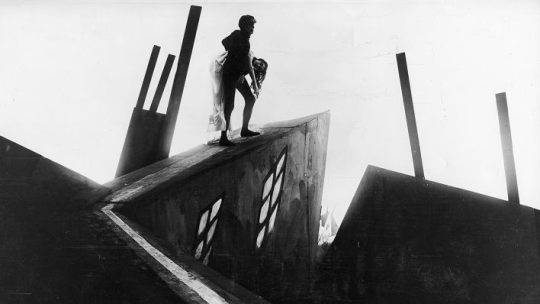
Considered the quintessential work of German expressionist cinema, the Cabinet of Dr. Caligari (1920) by Robert Wiene tells the story of an insane hypnotist who uses a brainwashed somnambulist to commit murders.
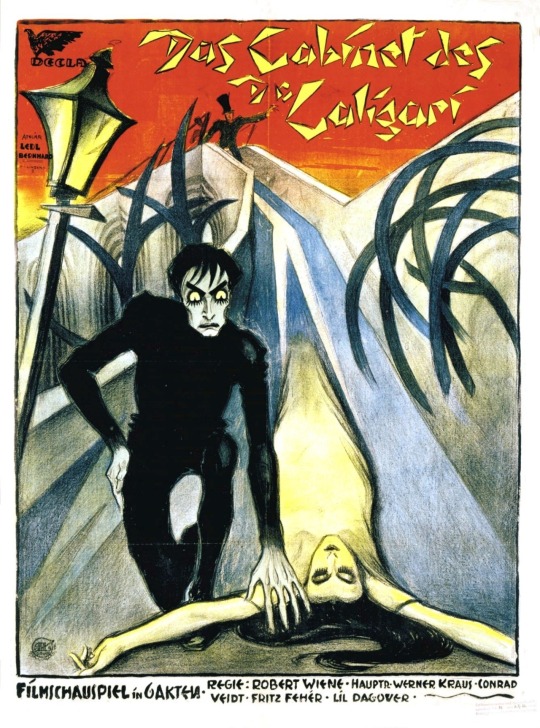
youtube
The film thematizes brutal and irrational authority. Caligari can be representing the German war government, with the symbolic of the common man conditioned to kill. The film include the destabilized contrast between the subjective perception of reality, and the duality of human nature.
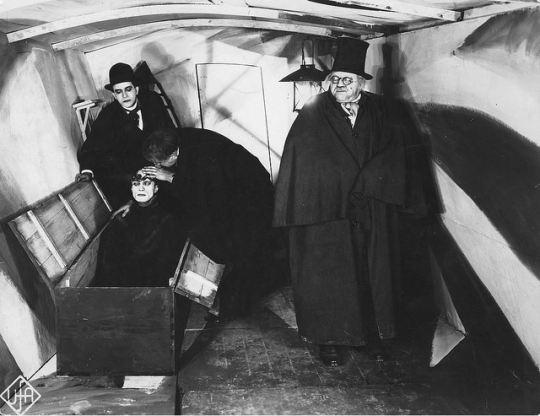
An unofficial adaptation of Bram Stoker's 1897 novel Dracula in film is the German version of Nosferatu: A Symphony of Horror (1922) by F. W. Murnau. Nosferatu is an archaic Romanian word Nesuferitu` meaning the offensive or the insufferable one. The movie is actually about the First World War and the plague is a metaphor for the mass death and destruction of the war.

youtube
Nosferatu was banned in Sweden due to excessive horror until 1972. All known prints and negatives were destroyed under the terms of settlement of a lawsuit by Bram Stoker's widow.

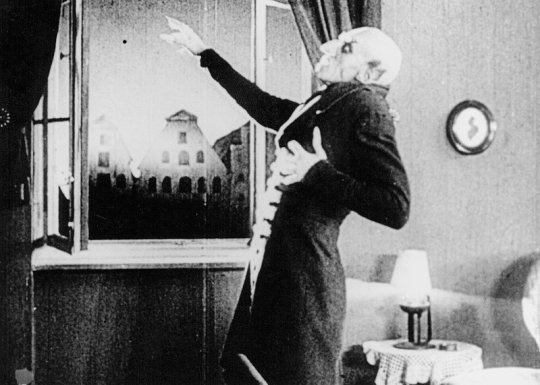
Berlin – Die Sinfonie der Großstadt (1927) is an experimental documentary by Walther Ruttmann. It begins with a drive of a high-speed train pulled by a steam locomotive through meadows, arbor and residential areas into the city and thus delimits the surrounding area from the big city.

The train arrives at Anhalter Bahnhof near the city center, where streets empty in the morning are filling up with people on their way to work. The rhythm of the city is getting faster and faster. With the 12 o'clock bell strike, the speed collapses. After lunch break and food intake, however, it begins to accelerate again in the afternoon.
youtube
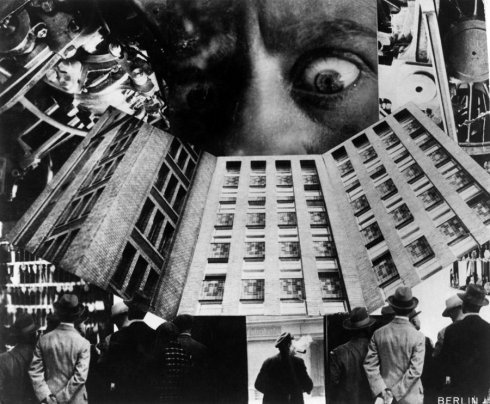
Cabiria (1914), an Italian epic silent film by Giovanni Pastrone, was shot in Turin. The film is set in ancient Sicily, Carthage, and Cirta during the period of the Second Punic War (218–202 BC).

It follows a melodramatic main plot about an abducted little girl, Cabiria, and features an eruption of Mount Etna, heinous religious rituals in Carthage, the alpine trek of Hannibal, Archimedes' defeat of the Roman fleet at the Siege of Syracuse and Scipio maneuvering in North Africa.
youtube

One the most influential films in cinema history, Dziga Vertov's exhilarating ode to Bolshevik Russia the Man with a Movie Camera (1929). It is a visual argument for the place of the documentary filmmaker as a worker, educator, and eyewitness in a proletariat society. The film is an impressionistic view of urban daily life, seen from a purely cinematic perspective.
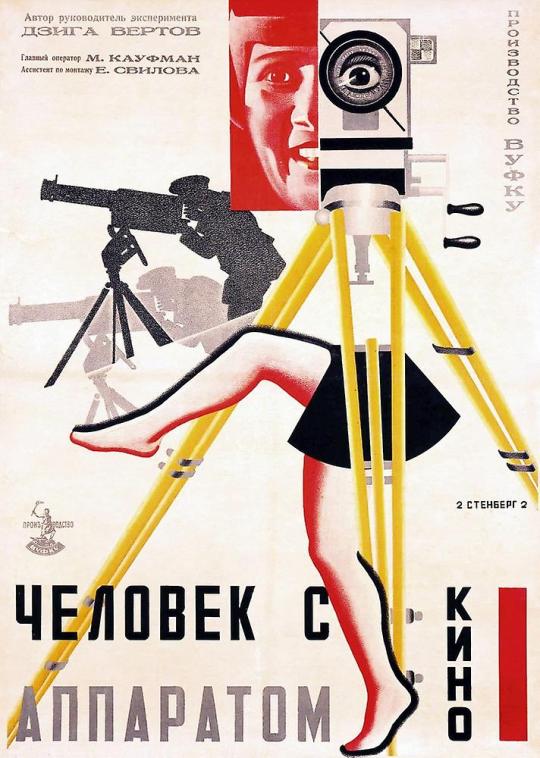
youtube

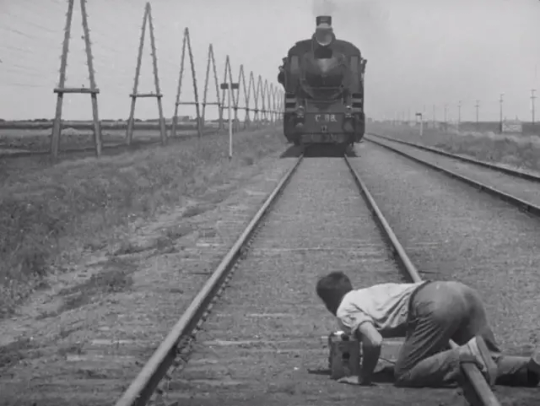
77 notes
·
View notes
Text

SUMMARY: An aspiring Romanian filmmaker obsessed with Hollywood actress Anne Hathaway goes to shocking extremes to convince Anne to star in his upcoming film.
#be my cat: a film for anne (2015)#found footage#psychological horror#2010s#romania#european movie#mentionable warning#animal death#horror#movie#poll#more than 50% havent heard
34 notes
·
View notes
Text
♀️latscho diwes djuviale♀️
💞 I made this blog to highlight the specific struggles Romani women face based on our sex, our race and our class
💞 I'm anti-gender, anti-sex trade, anti-religion, anti-capitalist
💞 I support women's and LGB rights. My feminism is female only!
💞 I'm a half-sinti, half-white working class homosexual woman living in Western Europe
BEFORE YOU BLOCK ME, READ THIS: x
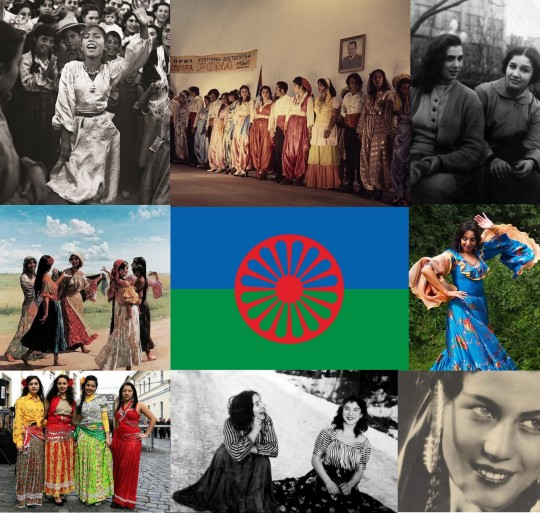
FAQ, BOOKS AND RESOURCES BELOW
General / Frequently asked questions
-> Difference between Roma and Romanian (x)
-> Difference between Roma and Sinti (x)
-> My profile picture is from De la source à la mer (1984), by Sinti-Manouche filmmaker and writer Pisla Helmstetter
-> My banner is from The Gypsies are Found Near Heaven (1975), by Emil Loteanu
Posts on the racialized misogyny targeting Romani women
-> general masterpost (x)
-> posts on Romani women being sex trafficked into prostitution in Europe (x) (x)
-> posts on the forced sterilization of Romani women in Europe (x) (x) (x) (x)
-> post on healthcare discrimination (x)
-> incest, sexual and domestic violence targeting Eastern European Romani women (x) (x)
-> Roma, religion and misogyny (x)
-> On "Gypsy witches" (x)
Inspiring Romani women you should know about
-> autobiographies by Romani women (x)
-> Sandra Jayat, French-Romani painter and poet (x)
-> Katarina Taikon, Swedish-Romani writer and antiracist activist (x) (x)
-> Elena Gorolova, Czech-Romani women's rights advocate (x)
-> Jelena Savić, Serbian-Romani feminist, poet and essayist (x)
-> Tela-Tchaï, French-Romani actress (x)
-> Amoun Sleem, Palestinian-Domari antiracist activist and feminist (x)
-> Philomena Franz, German-Romani Holocaust survivor and writer (x)
-> Vera Kurtić, Serbian-Romani lesbian feminist (x)
-> Kiba Lumberg, Finnish-Romani and butch lesbian artist (x)
-> Zilli Schmidt, German-Romani Holocaust survivor (x)
-> "15 Bad ass Romani ladies you should know about" (x)
-> Romani herstory, an "ever-growing digital library that celebrates women of Romani descent from the past and present, unsung heroines & trailblazers who refuse(d) to conform to stereotypes"
Romani feminist writings
-> Intersections of Gender, Ethnicity, and Class: History and Future of the Romani Women’s Movement, by Jelena Jovanović, Angéla Kóczé, and Lídia Balogh (x)
-> Gender, Ethnicity and Class: Romani Women's Political Activism and Social Struggles, Angéla Kóczé (x)
-> Lessons from Roma Feminism in Europe: Digital Storytelling Projects with Roma Women Activists from Romania, Spain and Sweden, Jasmine Ljungberg (x)
-> Romani women’s identities real and imagined: Media discourse analysis of “I’m a European Roma Woman” campaign, Jelena Jovanović (x)
-> Džuvljarke: Roma Lesbian Existence, Vera Kurtić (x)
-> Re-envisioning Social Justice from the Ground Up: Including the Experiences of Romani Women, Alexandra Oprea (x)
-> Angéla Kóczé on the hijacking of the Romani feminist and antiracist movement by neoliberal groups (x) (x)
-> Mihaela Drăgan on the racialization of Romani women (x)
-> quotes from Romani feminist books (x)
Learn about the Romani genocide
-> general post (x)
The Genocide and Persecution of Roma and Sinti. Bibliography and Historiographical Review (x)
Roma Resistance During the Holocaust and in its Aftermath, Angéla Kóczé, Anna Lujza Szász (eds.) (x)
O Porrajmos: the Romani Holocaust, Ian Hancock (x)
Porrajmos: The Romani and the Holocaust, Ian Hancock (x)
Responses to the Porrajmos (the Romani Holocaust), Ian Hancock (x)
Barvalipe Roma Online University (playlist of lectures about many different aspects of Romani history, politics and culture) (x)
Romani slavery in Romania
Brief overview (x)
Alternatives to the labrys flag

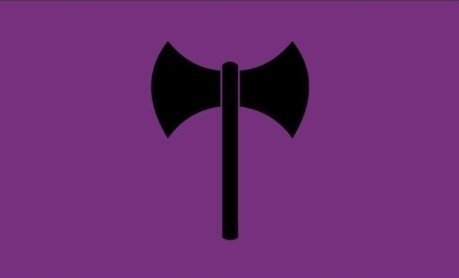
(first design by @/sapphos-darling)
362 notes
·
View notes
Note
Now… i wish it was this predictable. The truth is it is not. Many factors enter the game during winter lol… many actors have narratives … others have the favour of their colleagues (like Jamie Lee Curtis last year) and the academy loves a lil unknown movie (see paul mescal’s nomination) … a couple surprise nominations always happen // Do you think Seb has a narrative (e.g., being a Romanian immigrant to the U.S. as a preteen - how many Romanian actors/filmmakers have been recognized by the academy awards)? Also could this year's surprise nomination be ADM since it's also a lil unknown movie atp.
He has the “gave two great performances in the same year” narrative + he won in Berlin
Not sure about ADM being the surprise nomination (would love it to happen)
2 notes
·
View notes
Note
https://variety.com/2023/film/global/sebastian-stan-blue-banks-andreea-cristina-bortun-1235617304/ good news! Though it's funny they called Fresh an A24's movie, and it's curious he met the director in Cannes in 2021, bc he definitely wasn't at the festival back then, busy with P&T. Anyway, go female (and Romanian!) filmmakers!❤️
Oh my god, this is AMAZING 🥺 This makes me so profoundly happy! I know how much he's wanted to work with Romanian filmmakers in some way, and now he found a story that's so close to his heart, and by a female filmmaker too?? 😭 Wow, that is incredible and I love this for him, SO much ❤️❤️❤️ GO SEB AND AND GO FEMALE (AND ROMANIAN!) FILMMAKERS!!!!!
29 notes
·
View notes
Text
what's actually very annoying about those toks that are like me when i just wanna watch a marvel movie 🤪 but my filmbro boyfriend (ugh) wants to watch a 10 hour romanian documentary about a pigeon or whatever is that like. okay first of all those words are a choice. second of all those countries are making contemporary films and they are actually very fascinating and some of the best, most exciting filmmaking right now? i've been captivated by the romanian new wave since college, one of the best and most fascinating films i've ever seen is directed by a woman in bulgaria, hungary's contemporary filmmaking industry is burgeoning and very exciting, i just watched an amazing turkish film the other night, my favorite film of 2021 was from bosnia like. have you considered that you're just being boring and terminally incurious for social media clout? just admit you picked that region of the world bc you wanted to be bigoted in a way that wasn't outwardly racist if you went any further east or south lol
#also maybe break up with your boyfriend? idk#also i feel like if you look at the opportunity to engage with the cinema of another country as a chore instead of very exciting.....#have you considered perhaps that you don't actually love movies as much as you think you do?
14 notes
·
View notes
Text
Finished Peaky Blinders s1. Review from purely artistic perspective: it's good! Review from romani perspective: surprisingly, also pretty good!
The bar is on the floor here because any depiction of romani characters in fiction is usually terrible but i felt the show's portrayal of them was nuanced and sympathetic, and it helps that they're main characters so they aren't othered by the narrative. I don't know much about the Irish romani culture so i can't say for sure but there wasn't at least anything egregiously wrong that would've made me go 'they would never do/say that' (other than that at one point they apparently spoke romanian and not romani which is such a stupid mistake lol). I particularly liked the portrayal of the female characters like Polly and noted that there wasn't the typical oversexualization, they were just like. Normal women.
One thing i have a complaint though is that as usual romani characters are whitewashed and seemingly all played by non romani actors (i didn't look up everyone in the cast so don't know were there any roma actors in minor roles). I read that Cillian Murphy talked and spent time with people from the romani community which i appreciate and his performance is great but it's still frustrating that the cast is so white. It's not so much about physical appearance because romani people's appearance varies a lot and there are romani who are as lightskinned as Cillian or Paul Anderson etc., especially considering that the characters are apparently mixed, but romani is still a specific ethnicity and it's irritating that the casting directors and filmmakers always seem to think it's interchangeable with any other ethnicity. I understand it would've likely been hard to find lots of experienced romani actors for the show and they also wanted established actors to make the show more marketable. I still wish they would've tried to find romani actors for at least some of the roles, like one of the reasons why there aren't established romani actors in the first place is that they don't get opportunities
11 notes
·
View notes
Text
POZNAN, Poland—Despite the fact that Poland’s archconservative ruling Law and Justice party (PiS) looks well placed to win its third straight election on Oct. 15, its leaders are spooked that a low turnout will force it into a coalition, perhaps with the country’s even-further-right party, the Confederation Liberty and Independence. In desperation, PiS is lashing out wildly: at Germany, the European Union, the liberal opposition, developing world refugees, and critically minded filmmakers—as well as war-battered Ukraine, which until now it had buttressed with steely determination.
A Sept. 21 comment made by Prime Minister Mateusz Morawiecki that Poland will stop arming Ukraine, which he later walked back on, set off alarm bells from Kyiv to Washington. “The message is not that Poland is pulling its support from Ukraine,” said Konstanty Gebert, a Warsaw-based author and analyst, “but rather that Ukraine is much too ungrateful toward its colonial benefactor. It should simply accept what it gets from Poland and be thankful.”
Even if the Morawiecki remark was misinterpreted—Poland is boosting its own depleted defense capabilities, he clarified—the implications are unnerving for the Atlantic alliance, which until now has marshalled its members’ consensus on Russia’s invasion of Ukraine and active solidarity with Kyiv intact. If Poland, of all countries—a committed foe of President Vladimir Putin’s Russia and until now a champion of Ukraine—can waver in its support, how far behind are other countries long fatigued by the grinding war, the cost of sanctions, and hobbling energy crises?
Morawiecki’s comment came on top of a string of flare-ups between the neighbors and allies—flare-ups that PiS, rather than address constructively, has chosen to exploit for electoral gains. In a swing at Ukraine [on Sept. 20], Polish President Andrzej Duda, a conservative backed by PiS, said, “Ukraine is behaving like a drowning person clinging to everything he can. A drowning person is extremely dangerous; he can pull you down to the depths … simply drown the rescuer.”
He was referring to the burden Poland bears in backing Ukraine, which it has done by channeling humanitarian aid and weapons as well as opening its borders to refugees. But he could well have been describing PiS’s increasingly desperate flailing to burnish its populist credibility in the run-up to the election after years of holding power.
Poland and Ukraine have been locking horns over underpriced Ukrainian grain shipments, mostly corn and wheat, which last spring began to flood Polish, Slovak, Romanian, Bulgarian, and Hungarian markets until the Central Europeans, with the EU’s blessing, imposed a ban on Ukrainian imports, which expired on Sept. 15. When Russia first cordoned off the Black Sea to Ukrainian exports, the EU told the Central Europeans to open their borders to Ukraine to move agricultural commodities through their territories as an alternative route. The ban allowed them to do so while preventing domestic sales of the Ukrainian products. But Ukrainian grain, which is exempt from EU customs duties, leaked out into the Central European markets anyway. This forced out regional crops from domestic and some export markets, pushed prices down, and ignited farmers’ protestations. On Sept. 16, Poland and Hungary defied the EU and reimposed the ban on imported Ukrainian food products, which then prompted Kyiv to announce its intention to take the rift before the World Trade Organization.
In contrast to Romania, Bulgaria, and Slovakia, the Polish government has not been able to work out a compromise solution for the Ukrainian imports. The European Commission, which has no lost love for PiS, has sided with Ukraine.
“PiS is doing everything it can to divert attention from its own failures, but it’s not empty electioneering,” said Konstanty Gebert, a Warsaw-based author and analyst. “To get the big rural vote on their side, which it has to do, PiS is willing to pay a high political price for putting Ukraine down. The upshot depends on the electoral results, the percentage of peasant votes lost, and those gained by the extreme-right with their anti-Ukrainian propaganda.”
PiS’s flailing, Gebert said, reflects its conviction that only it understands the true interests of the Polish nation and that “its falling from power poses a life-or-death threat to the nation.” In the eyes of the PiS, Gebert added, “If it loses, Poland will come under the yoke of Brussels, be a slave to Germany, and flooded with Black and Muslim rapists. It wants to save Poles from the fate of people in the West, who they say can’t go out on the streets without fearing violent crime.”
Ukraine poured fuel on the fire by upbraiding Poland in front of the United Nations in New York. Ukrainian President Volodymyr Zelensky accused some EU countries of “feigning solidarity by indirectly supporting Russia”—a barb that understandably stung Poles, whose animosity toward Russia is legendary.
Another red-button issue at the front of PiS’s campaign is immigration. PiS is resisting EU plans to introduce a new migration pact that would give countries quotas of relocated migrants and require them to pay 20,000 euros (about $21,180) for each one they refuse. It is not the million-plus Ukrainian refugees in Poland that PiS encourages Poles to dread, but rather the roughly 20,000 refugees from Northern Africa and the Middle East that have entered Poland through Belarus this year. Belarus and Russia signal to these regions that individuals can gain access to the EU through Belarus; the unsuspecting refugees are let loose at the Belarusian-Polish border, often subject to beatings at the hands of first the Belarusians and then the Poles.
Agnieszka Holland’s film Green Border, which throws a harsh light on Poland’s treatment of refugees, premiered last week in Poland to the hysterical outcry of government officials, one of whom renounced the film as “disgusting libel” that is “harmful to the Polish state and Poles.”
While the Ukrainian refugees in Poland have thus far enjoyed the sympathy and support of Poles, their situation is changing, said activists from Logos and Spilno Hub, nongovernmental organizations in Poznan that assist Ukrainian nationals. Earlier this month, the Polish government announced it would be ending aid payments to Ukrainian migrants. However, in contrast to Germany, Ukrainian refugees in Poland are given immediate access to the job market, and they have pounced on it, helping Poland plug labor market gaps. The unemployment rate in Poznan, a business-minded city in western Poland, is 1 percent.
But Polish generosity is wearing thin. The Ukrainian activists say the social media rants against all refugees is vitriolic, much of it calling back to World War II-era atrocities between Poles and Ukrainians. A Ukrainian aid worker, Valentina, from the northeastern city of Sumy, was accompanying a class of Ukrainian school kids when teenagers accosted her, screaming, “Hey bitch, go back to Ukraine!” Physical violence is now increasingly common, Gebert said.
The geopolitical consequences of PiS’s histrionics reach far beyond Poland itself. In Slovakia, elections this weekend could bring about the return of Robert Fico, a former prime minister who is openly anti-EU and pro-Russia. Hungary, too, has long been a mouthpiece for Moscow in Europe.
And PiS’s most likely coalition partner, called simply the “Confederation” in Poland, makes no bones at all about its hostility to Ukraine and the more than 1.5 million Ukrainian refugees in Poland. (Its 2019 European Parliament campaign included a five-point platform: “We don’t want Jews, homosexuals, abortion, taxes, and the EU.”) Its presence in a coalition government led by PiS could entail a Poland-Ukraine realignment of some sort—and diluted sympathy for the Ukrainians now living in Poland.
A government that’s even more nationalistic than the current one in Warsaw might throw a wrench into Ukraine’s accession to the EU. After all, Ukraine’s high costs could shrink Poland’s slice of the EU pie. And a lukewarm, tight-fisted Poland could cause Kyiv to swap besties, putting its full faith in France and Germany rather than Poland. They, at least, have the clout in the EU that Ukraine needs, while PiS is openly hostile to Brussels.
PiS’s roughshod campaigning will hurt Poland in the long run, wrote Marek Swierczynski in Polityka, a centrist weekly news magazine. “PiS is toying with matters of strategic importance in this election campaign,” he argued. “And it is also toying with the very risky issue of anti-Ukrainian resentment. Now we have exposed ourselves to the criticism of global public opinion, all for the sake of this party scoring a few points with its own supporters.”
The gravitas that Poland has accrued over the past year and a half is immense—but it can expire if Poland’s will proves fickle.
4 notes
·
View notes
Note
does this imply mihais name is actually mihai flor
No no, "-escu" is just a very common suffix for last names in romanian. Popescu, Ionescu, etc. Back in the day it was a easier way than to say "son of X". But now they're just regular names, it doesnt mean your father's name was the one behind the suffix, but at some point you had an ancestor. So the implication is that at some point one of Mihai's ancestors wouldve been named Florea.
But my prev post was about the trend of -escu ending surnames being changed to -esco to sound more foreign. Eugen Ionesco, for example. I just saw a filmmaker on instagram going by the last name Popesco and immediately clocked her as being romanian living in france and i was wondering why this seems to be a thing. My research shows easier pronounciation and integration but i feel like there's more to it.
#ask#luciel🍬#anyway. thank you aimoto for giving my boy such a plain name it's genuinely refreshing#im not an -escu girlie irl but he really does feep real#feel*
19 notes
·
View notes
Text
More about some locations and scenes...
Kevin Phipps, who has worked as an art director on some of the most stylistically distinct films of all time, crafted a world of shadow and muted color for the wolves to inhabit. “He is one of the best art directors in the business and this is his first job as production designer,” says executive producer Hawk Koch. “The sets he created on this film were simply spectacular.”
Phipps was able to use the visual richness of existing locations in Bucharest to the production’s advantage in many instances. He transformed a former heating plant into the Brookwood Absinthe Distillery, which serves as Gabriel’s lair



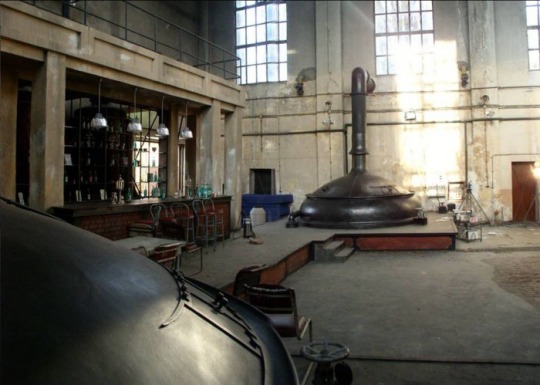
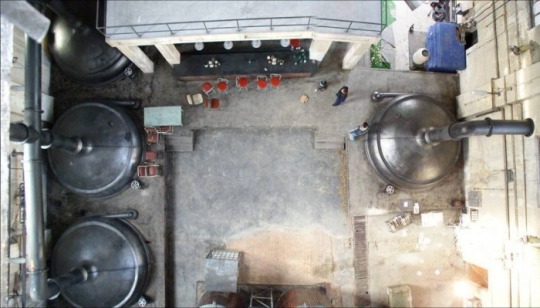


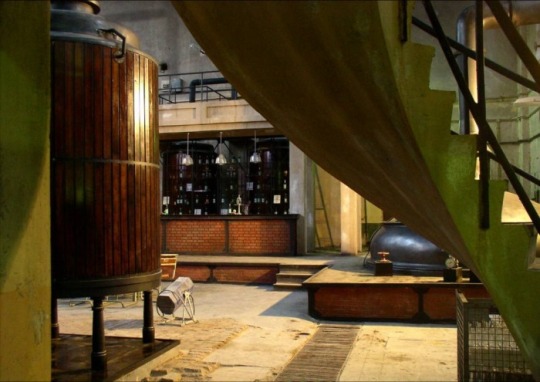

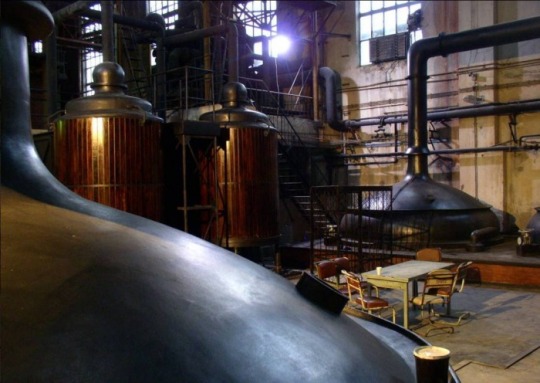

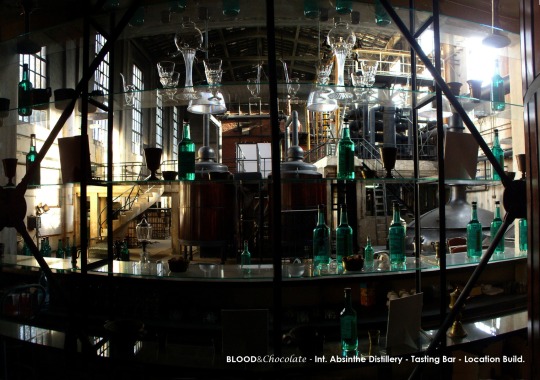
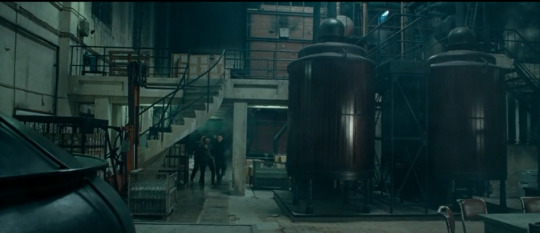


and created the Dacian Club by modifying a derelict half-finished concrete structure: Ceaucescu’s (the former leader of Communist Romania) Biblioteca Nationala (the National Library).
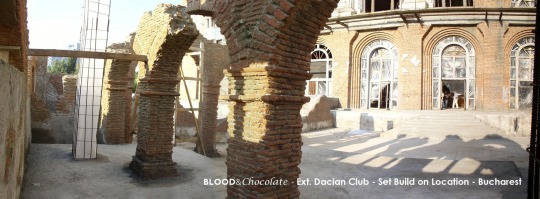

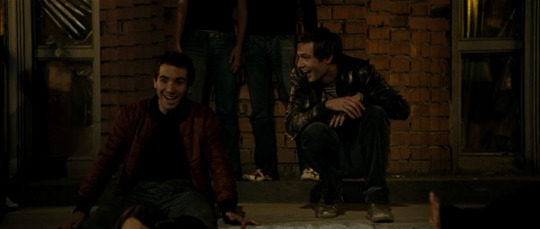
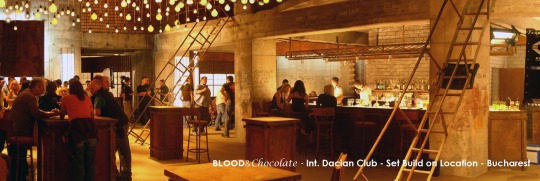

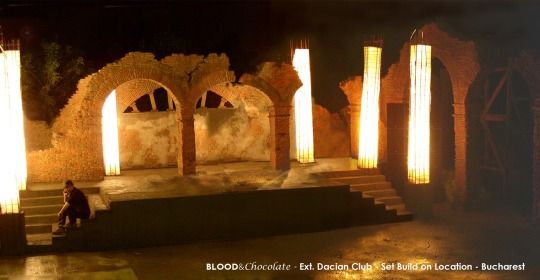
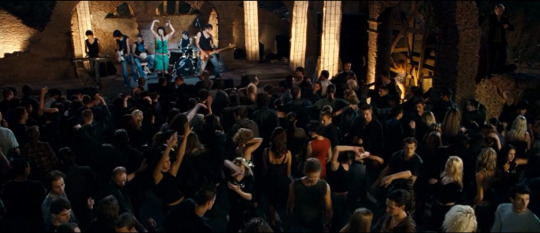
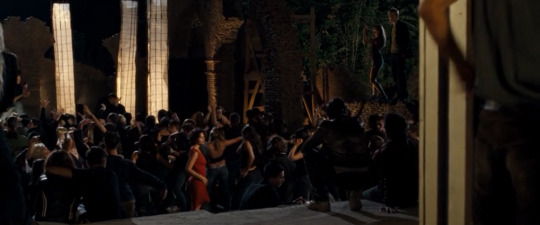
Dancy attests to the seamless integration of Phipps’s sets with the city itself. “The attention to detail is such that the sets fit in perfectly with the city as it really is.”
The filmmakers’ urgent need to provide a secure shooting environment for the wolves as well as for the cast and crew resulted in Phipps’s greatest challenge: the creation of several naturalistic forest sets, including a creek and a river, on MediaPro’s soundstages.
Phipps and his team rose to the challenge by using some 2000 cubic meters of soil, 50-60 real trees along with some polystyrene and fiberglass trees to reproduce a Romanian forest so authentic that it soon attracted its own mosquitoes, lizards as well as a resident owl. He recalls, “The first time we had a show-and-tell on that forest set, suddenly I looked up and there was an owl flying around in the canopy of our trees. Katja looked up and saw the owl and said ‘Kevin, you know that’s a really good sign that we’ll be really happy shooting on this set.’”

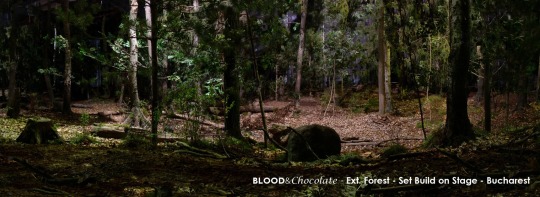

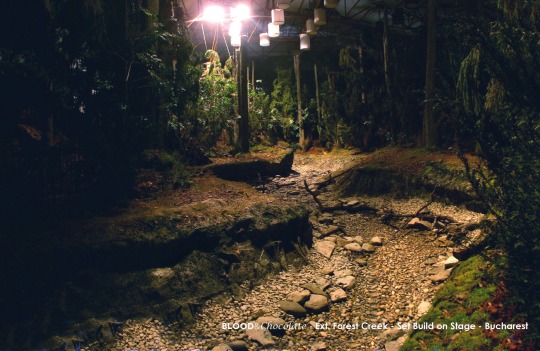
Once the creek and river sets were conceived, Phipps worked closely with SFX supervisor Allder on the mechanics, the water system, the pumping system, the filtration and the volume of water that would bring the sets to life.
The filmmaking team had already previsualized the world of the film using small scale models. “You can get down and get your lens into the model and really see how the set is going to shoot and what will be in each frame,” explains Phipps. “This approach was especially useful given the amount of running in the film. Everybody knew what they were getting – stunts, camera, lighting, even the actors.”
sources:
https://www.vladvieru.com/blood--chocolate---2005.html
http://www.kevinphipps.com/b-l-o-o-d--c-h-o-c-o-l-a-t/b-l-o-o-d--c-h-o-c-o-l-a-t/
http://blood-and-chocolate.katja-von-garnier.com/
http://madeinatlantis.com/movies_central/2007/blood_and_chocolate.htm
#bloodandchocolate movie#bloodandchocolate2007#set build#scenes#beautiful#vladvieru#kevinphipps#katjavongarnier#madeinatlantis
2 notes
·
View notes
Note
https://variety.com/2023/film/global/sebastian-stan-blue-banks-andreea-cristina-bortun-1235617304/ good news! Though it's funny they called Fresh an A24's movie, and it's curious he met the director in Cannes in 2021, bc he definitely wasn't at the festival back then, busy with P&T. Anyway, go female (and Romanian!) filmmakers!❤️
🙌🏻💄
2 notes
·
View notes
Video
vimeo
THE DEADMAN'S BRIDE (VOST La mariée du mort) from AKTIS Cinéma on Vimeo.
The Deadman's Bride / fiction / feature film / 100 minutes / Cornel GHEORGHITA
A French filmmakers crew set up shop in a small Carpathian Romanian village inn to film a documentary trilogy about the survival of pagan traditions related to baptisms, weddings, and funerals.
In his studio in Toulouse, a photographer named Martin discovers the demeanour of the beautiful Romanian girl Irina, while reviewing some rushes sent to him by his director friend Jacques, whose filming has been disturbed. A stranger to the Romanian world of rituals and superstitions, nevertheless Martin agrees to join and help out his director friend whose cameraman has fallen ill.
If the shooting of the first two subjects is managed without too much difficulty, it is not so for the last one: nobody dies in the area for them to film a funeral. The team chooses to stage a funeral, dragging the superstitious villagers into a macabre game.
production AKTIS Films : films.aktis.fr/en/
coproduction Sc Gheorghita & AKTIS Films
all rights reserved for all countries - © AKTIS Films 2022
0 notes
Text
There's a movie coming out next month in my country that is about a teacher (white European) teaching a young Romani delinquent how to read, which sounds like your typical social drama tbh, but then I looked up an interview with the filmmaker and he says "When I was researching for the film, I learned the Roma live off the grid and they can't fathom putting their children to school" huh! what! Roma don't live off the grid, Romani people are members of the same society everyone else lives in, we don't make up an inner society full of illiterate criminals. It is true that schooling is an issue with Romani people due to our social standing and economic struggles but you can't generalize a population of 15 million people that way. Then he says "but some associations do take care of them" by schooling them. Well guess what! I'm in one such association and that's such a poor way of looking at it. When my friend and I go volunteering (and that goes for everyone else in my association), we work with the parents of the kids because those parents do have the best interest of their children at heart, otherwise they wouldn't keep in touch with the association. It's not the association that takes care of the kids, it's the parents who take care of their children's education by relying on outside help when needed. Don't erase those parents. Later on, he says "I didn't want to make a political movie or a pro-migrant movie, so I chose to focus on Romani people because Roma are Europeans. If I had focused on Syrian people or on African people, it would have been much different. I wanted to talk about education, not integration." Except that migration politics have a lot to do with the situation of Roma in my country and the Romani actor he cast is a Romanian immigrant. This doesn't make sense. And at the end, he says "I didn't want to make a pro-Romani or an anti-Romani movie" why should people take position in favour or against the mere existence of a group of people? This is so tone deaf. I can't believe that movie is coming out, that man looks so unserious and his research seems so poor.
16 notes
·
View notes
Text
0 notes
Note
hi Minnie, some months ago, in January or February i think i sent you an ask that you never posted but it was a link about a Romanian woman saying Seb was financing Romanian scripts and i wasn't sure it was real but now after that announcement i guess it's probably true 🥺 or maybe he's just looking for stuff to produce and so. i wonder if he'll end up creating his own producer company, i hope he does!
Hi honey! I'm sorry I never posted your ask, I must have missed it! But oh wow yes, that seems like it might have had something to do with Blue Banks, you're right! That's so great 🥺 It's possible he's just been looking around too, yes, but either way it's great to see him get involved with Romanian filmmaking, like he said he wanted! I'm looking forward to more of Sebastian in his producer era, I hope it brings him lots of joy to help with the realization of stories and projects he cares about!
7 notes
·
View notes